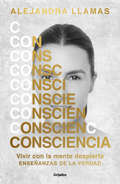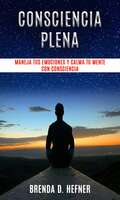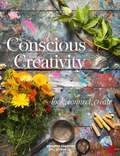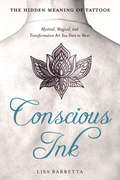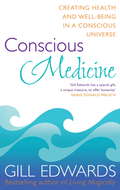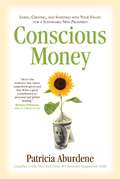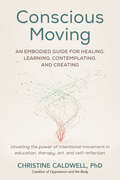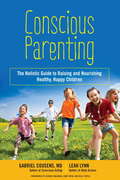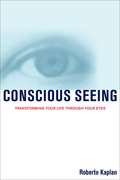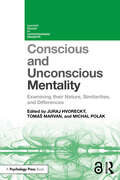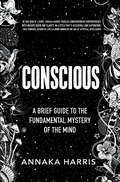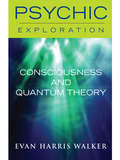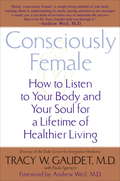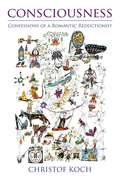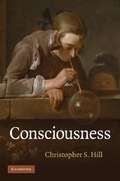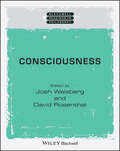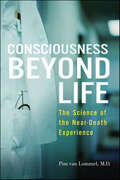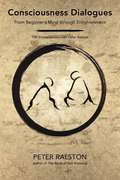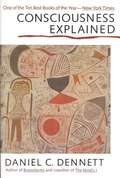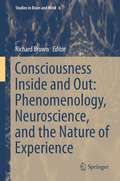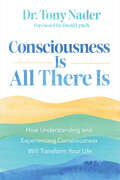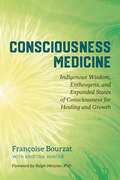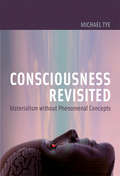- Table View
- List View
Consciencia
by Alejandra LlamasVivir en consciencia es vivir en confianza y presencia. Es recordar que nuestra verdadera esencia es sabia, ilimitada y pura. En consciencia escuchamos los llamados de nuestro corazón, el silencio nos habla a través de la inspiración y todo ocurre de forma espontánea y fluida. -Marisa Gallardo En esta nueva obra, Consciencia, Alejandra Llamas nos revela los secretos de los grandes maestros espirituales para vivir con la mente despierta. A través de sus páginas la autora nos acompaña a salir de la confusión ocasionada por la programación no cuestionada y las emociones reprimidas. La confusión nos lleva a la reacción, mientras que la toma de conciencia nos lleva a la libertad mental y emocional. Este libro nos recuerda que cualquier situación que nos saque de nuestra paz no tiene solución en el exterior, sino en hacer un cambio de perspectiva. “Como es adentro, es afuera”.
Consciencia plena - maneja tus emociones y calma tu mente con consciencia.
by Brenda D. HefnerLa actitud positiva que ganarás a través de la meditación te convertirá también en una persona más fuerte que podrá afrontar las adversidades en el futuro y atravesarlas saliendo ileso. Te darás cuenta de que eres capaz de superar los problemas estresantes que una vida del siglo 21 te puede presentar, por medio de los ejercicios presentados en este libro. Este libro te ayudará a entender: •-La verdadera profundidad del estrés. •-Los tipos de estrés y cómo nos afecta. •-El impacto del estrés en la salud física, mental, emocional y comportamiento. •-Las maneras en las que puedes identificar factores estresantes. •-Maneras en las que puedes liberarte del estrés en el ambiente laboral. •-Maneras en las que puedes reducir el estrés en tu vida personal. •-Maneras en las que puedes trabajar con tu mente cuando es esta la que provoca el estrés. •-Más importante aún, maneras de tratar con factores estresantes inalterables. Y mucho más... La meditación te ayudará a conectar tu mente con tu cuerpo, y aunque ya está físicamente vinculada, no se presta atención a las necesidades del cuerpo, o no entiendes la fisiología del cuerpo. Y es algo muy importante por aprender, es por esto por lo que lo he incluido en el libro.
Conscious Creativity: Look, Connect, Create
by Philippa StantonA self-help book for artists “crammed with practical ideas, inspirational images and creative exercises . . . establishing what kind of creative you are”(Mslexia).Unlock your creative potential with Conscious Creativity: a practical, playful guide bursting with inspiration to help bring more color into to your life. There is creativity in all of us, but it can easily be buried beneath our everyday concerns. Whether you’ve lost your mojo or just need some fresh ideas, artist and photographer Philippa Stanton’s lively guide will stimulate your imagination and reinvigorate your creative life.Engage your curiosity and connect your observations to your creative practice with activities such as:Noticing all the hues of one color you can see around youCreating an abstract textured image using herbs, spices and other dry ingredients from your kitchen cupboardsCollecting shadows: photograph hidden shapes and dark spaces that you haven’t noticed beforeConscious Creativity will help you open your senses to the beauty you may not notice every day, and show you how to capture it. Simple, engaging exercises that encourage observation and experimentation will give you an insight into your own aesthetics as you take a conscious step to note the colors, shapes, shadows, sounds and textures that fill your world, and how they make you feel.Embrace the joy of creating and learn to use your natural curiosity to take a leap into the most creative time of your life.“Full of tips and tricks on how to look at the world with a curious eye, it’s a brilliant way to breathe creativity (back) into our lives.” —Flow magazine
Conscious Ink: Mystical, Magical, and Transformative Art You Dare to Wear
by Lisa BarrettaThere is hidden, powerful wisdom in tattoos. Did you ever think of your tattoo as a charged body talisman or a portal into your spiritual self? Ancient cultures practicing shamanic tattooing laid the groundwork for our modern exploration of consciousness. Tattoos are both a revelation and a proclamation of your embodied archetypes, dreams, emotions, even a hint of past-life memories.Conscious Ink shows how this edgy skin art interfaces with our body’s subtle energy field and reveals how tattoo imagery ties into the potent energy of inner alchemy that expands our self-awareness.Are you prepared to:Find out how/why intention is the moving force behind your tattoo’s vibration? Do you bring on good luck or bad juju?Understand why the piercing of your skin and drawing of blood forms a symbolic link into the energy field of your tattooist?Explore how tattoos reveal past-life/current-life emotional memory?Discover how tattoos can shift the emotional energy stored in certain body areas?Mindful inking can be an amazing modality that awakens your spiritual self. Looking at tattoos beyond the lens of body art, Conscious Ink gives you a new perspective on tattoos and their undeniable roots in pure, magic and mysticism.
Conscious Medicine: A radical new approach to creating health and well-being
by Gill EdwardsRadical changes are afoot in medicine as we build stronger bridges between science and spirituality. In CONSCIOUS MEDICINE Gill Edwards explains that mind and body are inseparable and that emotions are crucial in health and disease. Her new approach to healthcare is based on the latest research into the transformative power of consciousness, energy and the bodymind. She explains how, when you break your old habits of thought, you can not only reverse disease processes and heal injuries but also attract more positive events and circumstances into your life. Chapters cover 'miracles' in health and why our current medical model is limiting, how negative thoughts activate the stress response in the body which eventually makes us ill, how the body speaks to us symbolically through symptoms and illness, how to break free from limiting patterns and create a new health-full future. Always thought-provoking and inspiring, this is an accessible, practical and joyous book.
Conscious Medicine: A radical new approach to creating health and well-being
by Gill EdwardsRadical changes are afoot in medicine as we build stronger bridges between science and spirituality. In CONSCIOUS MEDICINE Gill Edwards explains that mind and body are inseparable and that emotions are crucial in health and disease. Her new approach to healthcare is based on the latest research into the transformative power of consciousness, energy and the bodymind. She explains how, when you break your old habits of thought, you can not only reverse disease processes and heal injuries but also attract more positive events and circumstances into your life. Chapters cover 'miracles' in health and why our current medical model is limiting, how negative thoughts activate the stress response in the body which eventually makes us ill, how the body speaks to us symbolically through symptoms and illness, how to break free from limiting patterns and create a new health-full future. Always thought-provoking and inspiring, this is an accessible, practical and joyous book.
Conscious Money: Living, Creating, and Investing with Your Values for a Sustainable New Prosperity
by Patricia AburdeneWhy not make money and make a difference, too? A revolutionary blueprint for growing wealth, finding fulfillment, and changing the world by living your values. In the emerging era of Conscious Money, we achieve prosperity by tapping into the power of values, consciousness, and sound economic principles. By applying the wisdom of Conscious Money to your personal finances, you can build a foundation for sustainable wealth and true fulfillment. No longer will you need to choose between your core values and your paycheck. Instead you'll expand on-the-job creativity, grow income through conscious practices, and change the world as you: * identify your unique personal values; * break down barriers to financial success; * partner with companies that reflect your values; * express your values through conscious shopping; * tap into higher consciousness at the office; * harness your intuition to clarify financial choices; and * invest in enterprises that honor the planet.
Conscious Moving: An Embodied Guide for Healing, Learning, Contemplating, and Creating
by Christine CaldwellConscious Moving extends from one transformative belief: we feel more human, more empowered, and more ourselves when we live from that place within us—and all around us—that simply moves. And when we examine and trust in the emerging and evolving movement of our minds and bodies, we can better harness the tools needed to expand our creativity, wellbeing, and learning.Body-based psychotherapist, movement specialist, and renowned author-educator Christine Caldwell (Oppression and the Body) offers a radically ambitious mode of somatic awareness and inquiry—and shows how designing our own conscious movement practices can improve not only our own lives, but our relationships, communities, and culture.This anthology explores how movement practices can help us be more present; more grounded and intentional in responding to and working with experiences in the moment; and claim our own bodily autonomy. Caldwell and contributors explore these key benefits and applications in four critical areas:CreativityContemplationHealingLearningRooted in both ancient and modern scientific ways of knowing, Conscious Moving imparts fundamental principles and tools applicable to a broad spectrum of fields and professions. Topics explored in partnership with conscious movement practice include: Trauma and Oppression, Isolation and Loneliness, Addiction, Group Therapy, Sexuality, Creative Arts, and Grief.Encouraging each reader to pay attention to—and honor—their own embodied intuition, Conscious Moving is a non-prescriptive guide to accessing body-based wisdom for personal growth, community impact, and widespread social change.
Conscious Parenting
by Gabriel Cousens Leah LynnConscious Parenting is a great resource for parents seeking advice on optimal vegan nutrition and the importance of unplugging and having quiet time in nature for today's children. Anchored by extensive research on the importance of diet and environment by the world's leading authority on spiritual nutrition, the book is packed with advice and information to help you * choose authentic, organic, vegan food for optimal health;* support your child's emotional, social, and mental development; * counter the effects of environmental toxins and harmful media; * and create a nurturing environment for your child's spiritual growth. Table of Contents (Preview) Chapter 1: The Role of the Alive Parent / The Role of the Alive Child Chapter 2: Creating an Alive Environment / Six Foundations for Spiritual Life / The Sevenfold Peace Chapter 3: Perspectives on Support for the Alive Child According to Stages of Development Chapter 4: Supporting the Child's Physical Development / Living Foods for the Living Body / The Vegan, Live-Food Solution is Safe / A New Look at Transitioning from Eating Flesh Food / Don't Eat the Fish / Don't Pig Out / Poultry Problems Chapter 5: Why Authentic, Vegan, Organic Food? / Organic Foods / Organic Veganic Farming / Pesticide Pestilence / Protect Yourself Against Food Chemicalization / Genetically Engineered Foods / Irradiated Foods: Another Biohazard / Go Organic / The Low-Sugar Piece to the Whole Food Puzzle / Natural Low Sugar and No Sugar Sweeteners / Minerals and Children: Precious Gems / Children Need Dietary Fats / Protein for Growing Bodies/ Is a Plant-Sourced Diet Safe for Children? / But Children Don't Like Healthy Food? Soy What? And Other Vegan Foods to Be Wary Of Chapter 6: Holistic Veganism Chapter 7: Supporting the Child's Emotional Development / Living Foods and Freeing Up Emotions / Listening to How the Child Feels about Eating Animals / Thoughts, Emotions, and the Preparation of Food / Self-Esteem Chapter 8: Supporting the Child's Social Development / Living Foods and the Child's Social Development / Positive Socialization within the Home / Peaceful Conflict Resolution / Other Opportunities for Positive Socialization / Have You Ever Heard of the Candy Fairy? Chapter 9: Supporting the Child's Mental Development / Movement and the Mind / Childhood Depression / Nature and Learning / Emotional Safety and Learning / Deficient Diet and Mental Degeneration / Living Nutrition for the Living Brain / "Vitamin-O" (Oxygen) / Water / Food for Thought /The Mythological Dangers of High Cholesterol and High Fat / Health Dangers of Low Cholesterol / The Importance of Omega-3s for Health / Media Affects on the Child's Mind / The Harmful Effects of Pornography Chapter 10: Synergistic Toxicity of Brain and Body / The Great Vaccine Question for Parents Who Value Alive and Conscious Children: What To Do? / Gluten / Marijuana: Toxicity to the Brain / Fluoride: Toxicity to the Brain and Body / EMFs and Our Children's Brains / Perspectives on Dairy Chapter 11: Supporting the Child's Spiritual Development / Spiritual Nutrition for Childhood / Supporting the Spirit of the Child with Silence / Imagination / Meaningful Work /Wisdom Teachings / Music/ Chapter 12: Recipes for Children / Resources for Holistic Parenting
Conscious Seeing: Transforming Your Life Through Your Eyes
by Roberto KaplanConscious Seeing asks readers to look beyond the clinical diagnosis of their eye problems and see symptoms as valuable clues to their true nature. By developing an awareness that how they see is a reflection of their deepest selves, readers can gain the skills to modify their perceptions.
Conscious and Unconscious Mentality: Examining their Nature, Similarities, and Differences (Current Issues in Consciousness Research)
by Juraj HvoreckýIn this collection of essays, experts in the field of consciousness research shed light on the intricate relationship between conscious and unconscious states of mind. Advancing the debate on consciousness research, this book puts centre stage the topic of commonalities and differences between conscious and unconscious contents of the mind. The collection of cutting-edge chapters offers a breadth of research perspectives, with some arguing that unconscious states have been unjustly overlooked and deserve recognition for their richness and wide scope. Others contend that significant differences between conscious and unconscious states persist, highlighting the importance of their distinct characteristics. Explorations into the nature of the transition from unconscious to conscious mind further complicate the picture, with some authors questioning whether a sharp divide between unconscious and conscious states truly exists. Delving into ontological, epistemological, and methodological issues, this thought-provoking text challenges established paradigms and paves the way for a reimagining of consciousness research. It does so in an understandable and accessible way, making this a perfect companion for both experts and students of philosophy, psychology, and related fields. Chapters 2, 4, 9, 10, 14 and 16 of this book are freely available as downloadable Open Access PDFs at http://www.taylorfrancis.com under a Creative Commons Attribution-Non Commercial-No Derivatives (CC-BY-NC-ND) 4.0 license.
Conscious: A Brief Guide to the Fundamental Mystery of the Mind
by Annaka HarrisAs concise and enlightening as Seven Brief Lessons on Physics and Astrophysics for People in a Hurry, this mind-expanding dive into the mystery of consciousness is an illuminating meditation on the self, free will, and felt experience.What is consciousness? How does it arise? And why does it exist? We take our experience of being in the world for granted. But the very existence of consciousness raises profound questions: Why would any collection of matter in the universe be conscious? How are we able to think about this? And why should we?In this wonderfully accessible book, Annaka Harris guides us through the evolving definitions, philosophies, and scientific findings that probe our limited understanding of consciousness. Where does it reside, and what gives rise to it? Could it be an illusion, or a universal property of all matter? As we try to understand consciousness, we must grapple with how to define it and, in the age of artificial intelligence, who or what might possess it. Conscious offers lively and challenging arguments that alter our ideas about consciousness—allowing us to think freely about it for ourselves, if indeed we can.
Consciousess and Quantum Theory
by Evan Harris WalkerThis essay, chapter 23 of Psychic Exploration, presents a theory of consciousness. Also presented is a paradigm that provides a bridge between science and religion. The full volume of Psychic Exploration can be purchased as an ebook or paperback version from all major online retailers and at cosimobooks.com.
Consciously Female
by Andrew Weil Paula Spencer Tracy GaudetIn this revolutionary new book, Dr. Tracy Gaudet, director of the Duke Center for Integrative Medicine, shares her remarkable vision of a new way of looking at self and wellness, which will change the way women think about their bodies, their health, and their lives. Through her own personal journey as well as her work with thousands of women as an Ob-Gyn, Dr. Gaudet knows that being able to tap into the spiritual, emotional, and cyclical realities of female life has a powerful effect on health and well-being. Yet she has found that many women are "unconscious" of the intimate connections between these realms. Now Dr. Gaudet explains to women how to reconnect their bodies and their souls, in order to become "consciously female." Using her experience in integrative medicine, which draws on the best of both alternative and conventional Western practices, she offers mind-body techniques that will give you a deeper understanding of the inner workings of your body, and access to your unique feminine wisdom. By helping you make the best possible choices to support your health and wellness, the process of becoming "consciously female" will enrich and empower your life, day to day, week to week, year to year. From the Hardcover edition.
Consciousness
by Christof KochWhat links conscious experience of pain, joy, color, and smell to bioelectrical activity in the brain? How can anything physical give rise to nonphysical, subjective, conscious states? Christof Koch has devoted much of his career to bridging the seemingly unbridgeable gap between the physics of the brain and phenomenal experience. This engaging book--part scientific overview, part memoir, part futurist speculation--describes Koch's search for an empirical explanation for consciousness. Koch recounts not only the birth of the modern science of consciousness but also the subterranean motivation for his quest--his instinctual (if "romantic") belief that life is meaningful. Koch describes his own groundbreaking work with Francis Crick in the 1990s and 2000s and the gradual emergence of consciousness (once considered a "fringy" subject) as a legitimate topic for scientific investigation. Present at this paradigm shift were Koch and a handful of colleagues, including Ned Block, David Chalmers, Stanislas Dehaene, Giulio Tononi, Wolf Singer, and others. Aiding and abetting it were new techniques to listen in on the activity of individual nerve cells, clinical studies, and brain-imaging technologies that allowed safe and noninvasive study of the human brain in action. Koch gives us stories from the front lines of modern research into the neurobiology of consciousness as well as his own reflections on a variety of topics, including the distinction between attention and awareness, the unconscious, how neurons respond to Homer Simpson, the physics and biology of free will, dogs, Der Ring des Nibelungen, sentient machines, the loss of his belief in a personal God, and sadness. All of them are signposts in the pursuit of his life's work--to uncover the roots of consciousness.
Consciousness
by Christopher S. HillThis book presents a novel and comprehensive theory of consciousness. The initial chapter distinguishes six main forms of consciousness and sketches an account of each one. Later chapters focus on phenomenal consciousness, consciousness of, and introspective consciousness. In discussing phenomenal consciousness, Hill develops the representational theory of mind in new directions, arguing that all awareness involves representations, even awareness of qualitative states like pain. He then uses this view to undercut dualistic accounts of qualitative states. Other topics include visual awareness, visual appearances, emotional qualia, and meta-cognitive processing. This important work will interest a wide readership of students and scholars in philosophy of mind and cognitive science.
Consciousness (Wiley Blackwell Readings in Philosophy)
by Steven M. CahnCONSCIOUSNESS Consciousness is a thought-provoking collection of classic and contemporary philosophical literature on consciousness, bringing together influential scholarship by seminal thinkers and the work of emerging voices who reflect the diversity of the field. Editors Josh Weisberg and David Rosenthal have selected discussions that animate modern debates and connect consciousness to broader philosophical topics. Providing an expansive view of the philosophical landscape of consciousness studies, this carefully calibrated reader features classic work from the past four decades by seminal thinkers such as Thomas Nagel, David Lewis, Ned Block, Gilbert Harman, and Daniel Dennett, as well as important recent work from David Chalmers, Fiona Macperson, Joseph Levine, Kathleen Akins, and other contemporary philosophers. Divided into five parts, Consciousness explores the nature of consciousness, consciousness and knowledge, qualitative consciousness, and theories of consciousness. A final section on agency and physicalism includes work by Galen Strawson and a previously unpublished article by Myrto Mylopoulos. Philosophically challenging yet accessible to students, Consciousness is an ideal reader for many undergraduate and graduate courses on consciousness or philosophy of mind, as well as a useful supplementary text for general classes in philosophy and a valuable reference text for philosophers of mind, cognitive scientists, and psychologists.
Consciousness Beyond Life: The Science of the Near-Death Experience
by Pim van LommelIn Consciousness Beyond Life, the internationally renowned cardiologist Dr. Pim van Lommel offers ground-breaking research into whether or not our consciousness survives the death of our body. If you enjoy books about near-death experiences, such as those by Raymond Moody, Jeffrey Long, and James Van Praagh; watch televisions shows like Ghosthunters, Touched by an Angel, and Ghost Whisperer; or are interested in works that explore the intersection of faith and science, such as Spiritual Brain, Signature in the Cell, and When Science Meets Religion; you’ll find much to ponder in Consciousness Beyond Life.
Consciousness Dialogues: From Beginner's Mind through Enlightenment: 150 Conversations with Peter Ralston
by Peter RalstonPeter Ralston responds to 150 questions about consciousness from a global spectrum of people striving to grasp the nature of their own selvesThis illuminating collection of 150 questions and responses between Peter Ralston and a global spectrum of seekers provides a rare and nuanced look at the nature of consciousness and the path to understanding our true selves. Ralston is the author of the groundbreaking trilogy on the existential foundations of the human condition—The Book of Not Knowing, Pursuing Consciousness, and The Genius of Being. Here he has selected inquiries from more than two decades of question-and-answer exchanges with students as they work their way through his communications. The mosaic of viewpoints from an astonishing diversity of real people at all levels of consciousness work yields a narrative that is intricate, wide-ranging, intimate, and emotionally honest. These dialogues expand our understanding of consciousness, test our assumptions, and interrogate the very process of inquiry.
Consciousness Explained
by Daniel Clement Dennett"Consciousness" is notoriously difficult to explain. On one hand, there are facts about conscious experience -- the way clarinets sound, the way lemonade tastes -- that we know subjectively, from the inside. On the other hand, such facts are not readily accommodated in the objective world described by science. How, after all, could the reediness of clarinets or the tartness of lemonade be predicted in advance? Central to Daniel C. Dennett's attempt to resolve this dilemma is the "heterophenomenological" method, which treats reports of introspection non-traditionally -- not as evidence to be used in explaining consciousness, but as data to be explained. Using this method, Dennett argues against the myth of the Cartesian theater -- the idea that consciousness can be precisely located in space or in time. To replace the Cartesian theater, he introduces his own multiple drafts model of consciousness, in which the mind is a bubbling congeries of unsupervised parallel processing. Finally, Dennett tackles the conventional philosophical questions about consciousness, taking issue not only with the traditional answers but also with the traditional methodology by which they were reached. Dennett's writing, while always serious, is never solemn; who would have thought that combining philosophy, psychology, and neuroscience could be such fun? Not every reader will be convinced that Dennett has succeeded in explaining consciousness; many will feel that his account fails to capture essential features of conscious experience. But none will want to deny that the attempt was well worth making.
Consciousness Inside and Out: Phenomenology, Neuroscience, And The Nature Of Experience (Studies in Brain and Mind #6)
by Richard BrownThis volume is product of the third online consciousness conference, held at http://consciousnessonline.com in February and March 2011. Chapters range over epistemological issues in the science and philosophy of perception, what neuroscience can do to help us solve philosophical issues in the philosophy of mind, what the true nature of black and white vision, pain, auditory, olfactory, or multi-modal experiences are, to higher-order theories of consciousness, synesthesia, among others. Each chapter includes a target article, commentaries, and in most cases, a final response from the author. Though wide-ranging all of the papers aim to understand consciousness both from the inside, as we experience it, and from the outside as we encounter it in our science. The Online Consciousness Conference, founded and organized by Richard Brown, is dedicated to the rigorous study of consciousness and mind. The goal is to bring philosophers, scientists, and interested lay persons together in an online venue to promote high-level discussion and exchanging of views, ideas and data related to the scientific and philosophical study of consciousness.
Consciousness Is All There Is: How Understanding and Experiencing Consciousness Will Transform Your Life
by Dr. Tony NaderNEW YORK TIMES AND USA TODAY BESTSELLERFrom a renowned Vedic scholar, leader of the Maharishi Foundations, and Harvard-trained neuroscientist: a radical new paradigm for understanding Consciousness and finding enlightenment, peace, and fulfillmentDr. Tony Nader, a renowned Vedic scholar and neuroscientist, offers a direct path to peace for ourselves and our world that anyone can obtain—simply by delving into our own Consciousness. Dr. Nader provides the methods, tools, and guidance for connecting with our authentic inner nature and understanding how Consciousness is the essence of all existence, including addressing such fundamental questions as:What is the key to a well-lived, flourishing life in which we can all coexist in peace? Can freedom be compatible with law and order?How can we meet all our challenges as individuals and a society, including the environment, genetic engineering, and the rapid development of artificial intelligence?True wellness is a state of profound clarity, peace, and contentment, resulting from connection with our pure Consciousness. By enlivening our coherence between our Consciousness and the external world, we can find our happiest and highest states of ourselves."Consciousness Is All There Is will open doors of perception for you to a new and profound understanding of life."— Marci Shimoff, #1 New York Times best-selling author of Chicken Soup for the Woman's Soul and Happy for No Reason
Consciousness Medicine: Indigenous Wisdom, Entheogens, and Expanded States of Consciousness for Healing Healing and Growth
by Françoise Bourzat Kristina HunterA comprehensive guide to the safe and ethical application of expanded states of consciousness for therapists, healing practitioners, and sincere explorers Psychedelic medicines also known as entheogens are entering the mainstream. And it&’s no wonder: despite having access to the latest wellness trends and advances in technology, we&’re no healthier, happier, or more meaningfully connected. Psilocybin mushrooms, ayahuasca, and LSD—as well as other time-tested techniques with the power to shift consciousness such as drumming, meditation, and vision quests—are now being recognized as potent catalysts for change and healing. But how do we ensure that we&’re approaching them effectively? Françoise Bourzat—a counselor and experienced guide with sanctioned training in the Mazatec and other indigenous traditions—and healer Kristina Hunter introduce a holistic model focusing on the threefold process of preparation, journey, and integration. Drawing from more than thirty years of experience, Bourzat&’s skillful and heartfelt approach presents the therapeutic application of expanded states, without divorcing them from their traditional contexts. Consciousness Medicine delivers a coherent map for navigating nonordinary states of consciousness, offering an invaluable contribution to the field of healing and transformation.
Consciousness Reconsidered
by Owen FlanaganConsciousness is neither miraculous nor ultimately mysterious. In this broad, entertaining, and persuasive account, Flanagan argues that we are on the way to understanding consciousness and its place in the natural order. No aspect of consciousness escapes Flanagan's probe. Qualia, self-consciousness, disorders such as blindsight, various kinds of amnesia, and multiple personalities all find a place in this powerful synthetic theory that contends that consciousness is real, plays an important causal role, and resides in the brain.
Consciousness Revisited: Materialism without Phenomenal Concepts (Representation and Mind series)
by Michael TyeFour major puzzles of consciousness philosophical materialism must confront after rejecting the phenomenal concept strategy.We are material beings in a material world, but we are also beings who have experiences and feelings. How can these subjective states be just a matter of matter? To defend materialism, philosophical materialists have formulated what is sometimes called "the phenomenal-concept strategy," which holds that we possess a range of special concepts for classifying the subjective aspects of our experiences. In Consciousness Revisited, the philosopher Michael Tye, until now a proponent of the the phenomenal-concept strategy, argues that the strategy is mistaken.A rejection of phenomenal concepts leaves the materialist with the task of finding some other strategy for defending materialism. Tye points to four major puzzles of consciousness that arise: How is it possible for Mary, in the famous thought experiment, to make a discovery when she leaves her black-and-white room? In what does the explanatory gap consist and how can it be bridged? How can the hard problem of consciousness be solved? How are zombies possible? Tye presents solutions to these puzzles—solutions that relieve the pressure on the materialist created by the failure of the phenomenal-concept strategy. In doing so, he discusses and makes new proposals on a wide range of issues, including the nature of perceptual content, the conditions necessary for consciousness of a given object, the proper understanding of change blindness, the nature of phenomenal character and our awareness of it, whether we have privileged access to our own experiences, and, if we do, in what such access consists.
